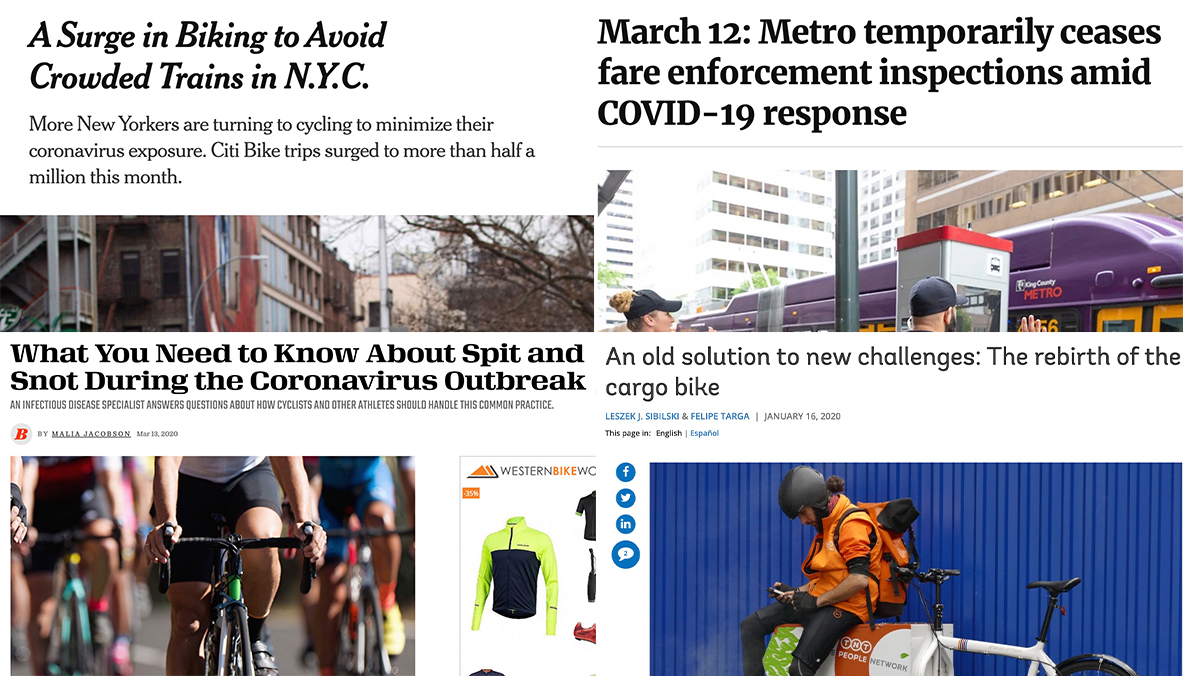
Good morning everyone. I hope you are staying home, staying well, and making the best of these difficult times.
Here are the stories from the past seven days that will keep you be informed and inspired…
Biking FTW (again): As we’ve reported for years, during times of disaster and crisis, bicycling reigns supreme. In New York City, biking rates have increased dramatically as people avoid subways and buses due to virus fears.
Bogota’s response: It’s not the “permanent ciclovia” we first thought, but the city that invented the open streets miracle (that inspired our Sunday Parkways) has announced 22 km of new bikeways to help encourage and manage a surge in biking.
#Atención Este es el mapa de ubicación de las ciclovías temporales que se habilitarán a partir de mañana.
Los corredores con nuevas ciclovías habilitadas operarán de 6:00 a.m. a 8:00 a.m. y de 5:00 p.m. a 7:30 p.m.#CuidemonosDelCoronavirus #AlertaAmarilla pic.twitter.com/xOc3yTEUJx
— Movilidad Bogotá (@SectorMovilidad) March 16, 2020
Urban planning and pandemics: “Rethinking density management is a key for long-term survival in a pandemic,” says a professor of global urban politics in the School of Design at the University of Melbourne in a discussion of city design and the spread of disease.
Snot rocket 411: As I’ve mentioned, issue of bodily fluids being shared during group rides is real.
Better scooters: Jump (Uber) has released a new model of e-scooter in Paris. Could we see these in Portland soon?
Mr. Tesla strikes again: Is it any wonder that a man who has no qualms about unleashing dangerous technology onto our streets thinks coronavirus is a joke and is downplaying the entire thing?
Advertisement
Transit is hurting: Amid virus fears, transit systems are taking a huge blow due to lost revenue and their brands could suffer long-term negative impacts depending on how this all shakes out.
Fare enforcement vacation: King County, Washington’s Metro transit agency has suspended fare enforcement during the virus outbreak. No word yet if TriMet will do the same.
Biking bans in Spain: Our friend Carlton Reid reports in Forbes that Amsterdam is forcing the closure of most small businesses, while keeping bike shops open. And in Spain, authorities are enforcing a ban on “leisure cycling” in an effort to keep people from crashes and injuries that might add to the demand for hospital beds.
Cargo bikes can change the world: I never tire of reading the latest from Europe about the potential of cargo bikes to transform our cities, especially when it comes from the World Bank. We can only hope the trend makes it way onto our shores.
Bike culture in an occupation: The simple act of cycling is a daring political and social act in Palestine, where people face violence and ridicule for exercising what many of us take for granted.
The lives we’ll save: This virus outbreak is exposing many truths about our way of life — including how deadly and toxic our air is when so many people use fossil fuel vehicles, and how clean it is when they don’t.
— Jonathan Maus: (503) 706-8804, @jonathan_maus on Twitter and jonathan@bikeportland.org
— Get our headlines delivered to your inbox.
— Support this independent community media outlet with a one-time contribution or monthly subscription.

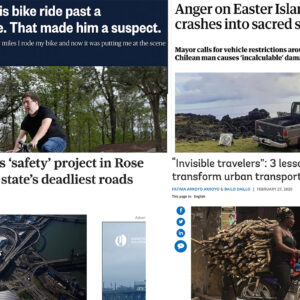
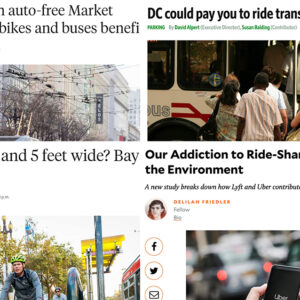
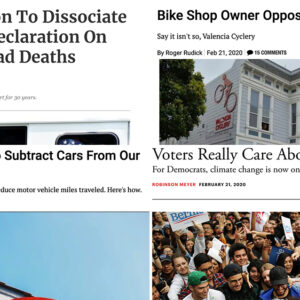
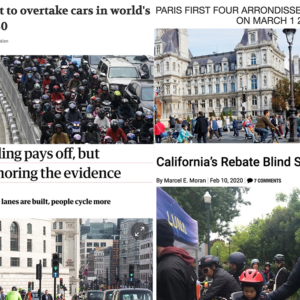
Replaceable batteries! Seems like a good idea for an e-scooter, right?
“Leisure cycling” is such a medically risky activity that it must be banned during a public health crisis? And how would that even be enforced? Fines for anyone seen wearing any spandex? I’ve got an involuntary week off work right now and I’m planning to make the most of it by enjoying spring on the Banks-Vernonia trail tomorrow.
“I’m riding. Finishing my ride. Enjoying my ride.”
Walter Sobchak
One thing you can probably safely say about Musk without unnecessary editorializing is that he tends to underestimate risk (except in the case of AI, where I think he overestimates it).
You can be critical of this trait, but there is no denying that it has led him to do some audacious things that no one else has been able to do, and which most people would have considered impossible. And, for his audience at least (i.e. his employees, who presumably skew young and healthy), comparing the risk of death from covid19 with the risk of death in a car crash may not be wildly inaccurate.
I’m not defending his statement, but I think the way it was presented here reveals a bit of underlying bias, and has a very tenuous connection to anything even vaguely connected to bicycling. What do the CEOs of other car companies say about covid19? And why should we care?
I’m biased against Elon Musk. I think his approach to business endangers the lives of people and his company is directly connected to bicycling because of how he’s considered a leader in car technology that can/has injured/killed vulnerable road users. Musk isn’t like other car company CEOs, people follow him and worship him. I also think he’s a good illustration of car culture more broadly (and the selfishness and dangers it comes with) and that’s a topic I think it worth tracking here on BikePortland. But yeah, I could have easily left it out of the Roundup. Thanks for your comment.
See that would’ve been my takeaway in the first place. He has thoughts about the virus, yeah congratulations, but did I just hear him admit how deadly cars are?
You almost make it sound like the dangers of car crashes are some great industry secret, as if manufacturers hadn’t made safety a key selling point on a range of vehicles for a long time now.
But yeah, Elon, we caught you!
Wow yes how immature of me.
Is Musk an antivaxxer too? I hear his exact same argument about average risk from antivaxxers about the measles. Does he seriously not get that people will die unnecessarily If we allow this to spread too fast and overwhelm our hospitals? I get the reactions to people panicking and hoarding food and necessities but his response seems like an overcorrection.
In the larger context, he’s wrong. It’s a simple as that.
Musk is doing what he does, ignoring the future. He’s focused on the Right Now, and with that he’s right.
We have a pandemic in this country that is killing it’s most vulnerable, and then the COVID-19 hit us and we put the driving pandemic on hold. So much so that it’s now OK to leave your disabled motor vehicles discarded around most of the city.
Musk has nothing to worry about as it’s obvious we still value cars above most other things. Sure they’ve killed a lot, maybe more than this virus will, but we won’t be closing freeways because a million people died.
He should pretend to care, because his industry isn’t the one that’s in trouble.
Here we have Elon Musk, who passes for a very smart person, saying that car use is a greater danger than the current pandemic. OK, welcome to the club, Mr. Musk.
An epidemiologist whose credentials I haven’t checked says industrial pollution in China was killing more people than a fearsome disease. But the pollution was sort of OK, business as usual?
Strange times.
I was initially excited about the arrival of mountain biking season, despite the pandemic, as I was thinking of it as one of the more pandemic-resistant activities due to distance from others. But then I considered the prospect of breaking my wrist or collarbone in a fall, and then having to go to the ICU to occupy medical resources that will be needed to manage covid, while also exposing myself to the virus.
I’m liking this situation less and less with every passing day.
If you’re going to shred, get it done this week, before the hospitals start filling up…
If your crash lands you in the ICU, you suffered more damage than a broken a wrist or collar bone.
The pollution reduction aspect of all the shutdowns is fascinating. The images in the linked article used NO2 as the pollutant to measure, but I wonder about the GHG impacts. What if we just took a two-week rolling pollution holiday every year? What would that do to our CO2 levels? I saw a tweet this week that said Climate Change should hire Coronavirus’s publicist…
Lots of “likely” statements in the report, lots of red flags.
Should we expect to see a similar study of interior home pollution such as mold and carbon dioxide? How about a study on increased domestic violence and divorces of people who suddenly have to live with one another (as already reported on the BBC) , confined to their homes without the usual outside social distractions?
And of course there are the huge job losses in the already low-paid service industries, with families made destitute by the loss of income and who can’t afford childcare for their kids as schools get closed, especially in the 12 US states that still don’t have Medicaid/Medicare for poor people. Will there be a study of the long-term impacts of closing society down, of the increased poverty rates and crime, the loss of civil liberties and a just society, how the poorest service workers are hit far harder than the tech-savvy rich?
Sure, the estimated benefit in lives saved is nothing more than an estimate, and this was not a “study”, merely an observation. Yes, all the other negative things you cite are also observations of what can happen when large sectors of world society are semi-forcibly shut down simultaneously. I don’t think we need studies to know that unplanned, large-scale shutdowns of this nature will have negative impacts. I know this is an emotional issue for a lot of people, but I’m only imagining what could happen if similar measures were taken regularly, but in a planned fashion so that workers in service jobs weren’t impacted so devastatingly. If we did something that wasn’t simultaneous the world over, but rolling from continent/region to region throughout the year. Sure, I don’t have the faintest how to plan such a thing, but we are noticing a few positive effects of the various virus mitigation measures—is there a way to accomplish the same thing to a lesser extent, but with a plan that doesn’t have the negatives we all acknowledge are very real?
Transit is Hurting: My city considered cancelling transit too, but they quickly figured out that our users literally have no other options – they cannot afford Uber and they don’t trust their neighbors to help. Our transit dependent users are overwhelmingly black and very poor, and many are disabled and have to see doctors on a regular basis – quarantine-in-place is not really a viable option for them. So in response our municipal transit system reduced service from every half-hour to every hour, and uses the saved resources to deep-clean the buses several times a day (we already had some of the cleanest buses I’ve ever seen for public transit.) Ridership is down, of course, so passengers can now sit further from each other.
If sick people are routinely riding the bus, everyone who rides the bus is going to get sick, and no one is going to want to ride the bus anymore.
I’m not offering a solution, but it does occur to me that large enclosed vehicles may not be the best thing in times of pandemic, and make me think about my own transit usage. Even after the pandemic has peaked, that “ick factor” is likely to linger for a while, depressing transit use for anyone who has other options (as I do).
What you say could be true of any enclosed vehicle, including airplanes, trains, cars, etc. that have two or more people sharing the same ride. But from chatting with our local bus mechanics, I’m now far more confident that our buses (which tend to be newer than TriMet’s, plus 16 of our 40 full-size buses are all-electric) have the machinery to fully clean the air within the bus in regular cycles, that the air on the bus is far more germ-free than the air in a supermarket for example, or in our own homes. Everything is relative.
To a certain extent, yes, except airplanes, at least, have better air management, including HEPA filtration which likely helps, and in cars, you have control over who, if anyone, you ride with, unless you’re in a carjack or kidnapping situation. And it is easier for most people to find alternatives to the local bus than a plane if they have no choice but to travel, at least until the hyperloop is operational.
I think we’ll need a few months free of virus-panic before we’ll be ready to return to happily swapping everything with everyone on a public bus.
Mind you, in my town, over 90% of our riders are “captured”, they literally have no choice but to use public transit, icky or not – Uber is too expensive, they don’t trust their neighbors (nor should they), there are no sidewalks nor bicycle facilities, and they cannot drive (for reasons of disability or for legal reasons, or in my case because I never learned to drive.) Fewer than 10% are “choice” riders like yourself. In Portland last I heard, about 70% are choice riders and 30% are captured riders, but I hope someone will correct me if I’m way off.